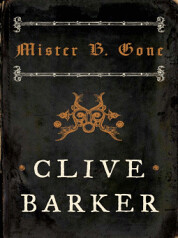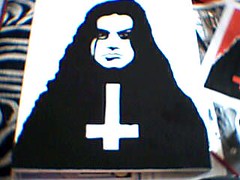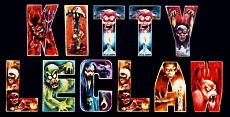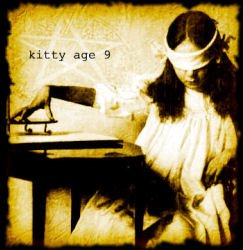This summary is not available. Please click here to view the post.
Sunday, April 27, 2008
Sunday, April 13, 2008
Clive Barker: Mister B. Gone

Mister B. Gone, the latest dark offering from Modern Day Master of Horror Clive Barker is a short novel in which the main character, an ages-old demon named Jakabok Botch, speaks directly to the reader. He offers a bargain that is difficult to resist: anything you want in exchange for one simple favour. "Burn this book!"
Jakabok Botch is a gruesome character. He is burned beyond comprehension, which affords him the ability to walk about in the human world without being recognized as a creature of demonic origin. Botch receives his first searing at the hands of his own father, a cruel and merciless figure who schools him in the art of distrust from a very early age. In the midst of a harrowing escape from the tyranny of his parents, Botch is literally fished from the depths of hell and finds himself in an unfamiliar environment, surrounded by bloodthirsty mortals.
Jakabok finds salvation in Quitoon, another demonic creature he meets along the way. Quitoon provided Jakabok with not only companionship, but also with a future. Together, they made plans to see and do great and devious things, and Jakabok was willing to follow his new friend to the very edge of existence. In many ways, their relationship is like a love story: the heinous reject finds his soul renewed and his faith restored by an intriguing and powerful stranger.
Barker has hinted that this book is somewhat autobiographical in nature, being that he feels that Jakabok Botch is representative of his dark half. While Barker has painted a a portrait of his demon complete with all its snarls and scars, the resulting image is really more piteous than it is fearsome. While Botch may be cruel, and hateful, and blasphemous, and a liar, he is also a tragic creature who appeals to the sympathetic nature of anyone who has ever been persecuted, or felt wretched, or alone.
Jakabok Botch's account of how he is able to survive in the mortal world becomes a tale of the quest he and Quitoon embark upon in search for a device which has been reported by angels and demons alike to possess the power to change the world forever. While Jakabok hasn't much interest in the world, he goes along with his volatile friend, leaving a path of bloody destruction in their wake.
The two demons are separated after Quitoon threatens Jakabok, taunting him with his impressively violent abilities. Jakabok feels betrayed by Quitoon, and begins to question whether the emotional bond that exists between them is entirely mutual. Each of them sets off alone, Quitoon in search of the mysterious device, and Jakabok Botch in search once again for meaning.
The pair are reunited in Germany, in the midst of an epic struggle between the forces of Heaven and Hell. It is here where Jakabok becomes imprisoned within the very book which tells his story. Again, the demon pleads (as he does throughout the course of the novel) with the reader to burn the book in order to end his misery. Or perhaps... to set him free?
While this novel makes for a delightful, short read, many aspects of the book seemed unfinished to me, or at least not fully realized. As always, I immensely enjoyed reading Barker's rich depictions of gory encounters, and as such, I certainly would have preferred Mr. B. Gone to have been at least twice its actual size. The concept of the novel, it's driving force (the demon speaking to you from the pages of the book, cunningly convincing you to do his bidding) is such a fresh and inventive one that I would have liked to see it explored more thoroughly than the novel's 240 pages allowed.
3/5 Kitty Skulls = Wait for this book to hit the Bargain Bin.

Saturday, April 12, 2008
Tiger Lillies: Seven Deadly Sins

Dark Cabaret darlings Tiger Lillies are back with a deliciously deviant new album, which chronicles man's (inevitable?) fall from grace. Seven Deadly Sins delivers the same unique brand of carnival side show camp peppered with maniacal brutality their fans have grown to love across the span of their impressive discography. The lyrics are, as always, bloody, gutty, gory, and brutally honest.
In the begging, there was "Adam and Steve." This song represents the Lillies' personal take on the concept of original sin. True to Tiger Lillies form, it is not the Bible story most of us are familiar with.
The next track on the album is called "Gluttony" and its message is simple: "he wants to be fulfilled." This song details the plight of the emotional eater, and given the plumpness of vocalist Martyn Jacques' silhouette, I wonder if it is perhaps more autobiographical in nature than some of the others. This is the first song on the album which caused me to reflect on what would come to be a recurring theme: the lengths to which the average person will go to fill a perceived void inside oneself. The rambling belch is a thoughtful touch, but could make for unpleasant background music once this album has become a well-loved volume in one's mp3 collection.
"Pride" is an absolutely haunting track, employing the use of a musical saw, played by Adrian Stout. To get a similar sound, other artists have employed the use of an electronic device invented in 1919 called a Theramin. The Tiger Lillies never disappoint. They bring the real thing, and it helps to create a gauzy, ethereal atmosphere like the one I can imagine being present on The Day of Final Judgement. Jacques' voice is beautifully rough, like a beyond-her-prime diva after too much whiskey and cigarettes. In a ghostly voice, he warns: "pride will eat your love."
"You wanna fuck the world..." Surely, we have all harboured this fiendish desire at one time or another. When I hear the song "Lust" I picture a hideous troll of a woman taking her clothes off for me at a 25 cent peep show. Sadly, the off putting gleam in her eye is too familiar to ignore. Jacques' voice is shrill as the vulgarities spill from his mouth, and even Satan himself gets in on the slimy action, licking his lips in filthy anticipation of our sins.
The saw again adds its melancholy trill in the sad, sober "Life is Mean." This song encapsulates the hopelessness of being human. In spite of our conquests in pursuit of happiness, and the sins we commit along the way, there is always that heart wrenching moment in which we realize the futility of our existence. We all seem driven to fill an impossible void. "So the cycle spins, no one ever wins." There is something bone-chilling about this song, as it speaks to anyone who thought their life would somehow be more meaningful than it has revealed itself to be.
In complete contrast to the preceding track, "Envy" is light an airy; it begins with a ukulele and a kazoo. Everything about this song is blatantly reflective of current societal attitudes regarding what we feel is owed each of us as a matter of course. A brooding sense of self-importance lives in us, unleashing a gamut of emotions ranging from mere desire to flat-out, bloody murder-plotting envy. Envy is a natural relative of gluttony, as it relates to a culturally-nurtured need to consume all that we can in order to fill any emptiness we perceive in our lives. "A phantom of your fantasy." Our culture is encouraged to envy through the media, the entertainment industry, the food service industry, drug pushers, pimps... "Oh well!" Jacques chimes happily. Fucking brilliant.
Listening to "Anger" for the first time was like hearing the contents of my most dark and secret thoughts being shouted back at me through a megaphone. It is related to envy in that anger often stems from our feelings that we are not getting what we deserve. This track boasts the carnival side show sort of feel that Tiger Lillies fans have grown accustomed to; very heavy on the accordion.
In "Baby's Dead" Jacques sounds like a deranged Muppet singing atop a broken-down piano in a smoky lounge that smells of semen and broken dreams. Meanwhile, "Knock You About" could almost serve as a soothing lullaby for a fussing child, with a stern warning woven in between the threads. Like "Rock a Bye, Baby" but with a decidedly more hands-on brand of violence.
"The wife beater meets his wife, he'll beat her all her life." "Down to Hell" unearths memories of sitting in a hard, wooden pew, listening to an odious choir howling pleading prayers for our salvation. However, I don't recall such delightfully sickening detail ever being hurled from the the preacher's pulpit.
The album's final track, "Know What it Means" is the point at which the final threads of the story are laced together. Jacques' vocals seem to pass judgement on the listener. This hasn't been a collection of songs about nondescript damnation, this album has been about your damnation. We, as a society, seem to live only to sin.
The Seven Deadly Sins are in our thoughts, and they are in our words. They live in our actions, and also in our failure to act. They are alive and well inside every one of us, and they are feeding off of parts of us we aren't even aware of at this very moment.
5/5 Kitty Skulls = Pick of the litter!
Tiger Lillies are:
Martyn Jacques: vocals, accordion, piano, guitar, harmonica, ukulele and the banjolele
Adrian Huge: drums and percussion, backing vocals
Adrian Stout: double bass, musical saw, backing vocals
Sunday, April 6, 2008
Alucarda: A Progressive Portrait

This portrait is based upon the video jacket artwork from one of my all-time favourite horror films, Alucarda. This piece was completed last year, using acrylic on canvas.The first few snaps were shot on a webcam, and are of very poor quality.




















